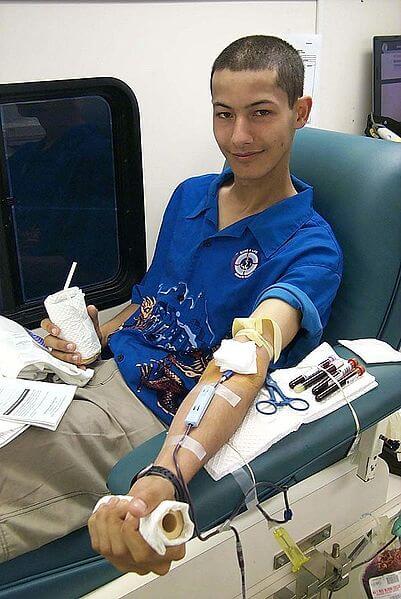The types we know ABO and Rh are just two of the variety of blood types each of us has. The researchers estimate that beyond the 30 that are known, there are another 10-15 types that need to be discovered for the protein that characterizes them. This discovery will prevent tissue rejection

We all know our blood type, is it B, A, AB or O. We may even know if the Rh (Rhesus) is positive or negative. But what if the lower blood type (Langereis) or the young blood type (Junior), are they positive or negative? Most people have never heard of these types. However, this knowledge can be "a matter of life and death," says University of Vermont biologist Brian Balliff.
While the problems that result from transfusions of the wrong blood type are rare, there are some ethnic groups that are at higher risk for this blood type mismatch. Over 50 Japanese are considered to have a negative young blood type and may encounter problems when receiving a blood transfusion, as well as in cases of a conflict in this blood type between the mother and the fetus.
According to Balif, these blood types were known, but their molecular basis remained a mystery until now. In the February issue of Nature Genetics, Ballif and his colleagues reported the discovery of two proteins in red blood cells responsible for the lesser-known blood types. They named the two molecules ABCB6 and ABCG2.
Only thirty proteins were previously identified as responsible for the basic blood types, Balif said, "but now the number is up to 32." This discovery comes after a decade in which no new proteins associated with blood types were identified. The two recently identified proteins are also associated with resistance to anticancer drugs, so the findings may have implications for improving the treatment of breast cancer and other types of cancer.
Balif and his French colleague Arnaud Lionel from the French National Center for Blood Transfusion in Paris, examined the proteins using a mass spectrometer. They tested antibodies to these two blood types developed by Yoshihiko Tani of the Japanese Red Cross Blood Center. After identifying the proteins in Vermont, Arno and his team in Paris continued to conduct genetic tests and read the sequence of the gene responsible for coding these proteins. "We did indeed find mutations in the particular gene in all the people in the sample who suffer from these problems."
"Beyond the ABO and Rhesus (Rh) blood type, the International Society of Blood Transfusion has identified 28 other blood types with names like Duffy, Kidd, Diego Lutheran. But the lower blood type (Langereis) and the young blood type (Junior) were not on the list. Although the antibodies to these two blood types -Junior and Langereis (or Lan) were identified decades ago in a pregnant woman, all of her pregnancies ended in miscarriage due to blood type incompatibility. The genetic basis of these antibodies was not known until now. Therefore, very few people knew if they were positive or negative in these two types," said Balif.
"Transfusing blood to a person who has antibodies to Lan is a challenging operation. wrote the researchers in an article in Nature Genetics, partly because blood donations of this type are rare), but mainly due to the lack of chemical substances to test these proteins. Donors with negative young blood are also rare. This may change soon.
Thanks to the findings of the new research, medical workers will be able to scan the proteins of these new groups in a faster and safer way. "This will allow them to be better prepared with the right blood when such a transfusion is required. Now that we know these proteins better, these tests will become routine," he said.
"This discovery may be especially important for organ transplant recipients," says Balif. "As we know more and better about transplants, we do everything we can to improve success, but sometimes tissues or organs that seem to be suitable are rejected by the body, which can lead to death. We don't always know why rejection occurs, but it may be related to these proteins."
Balif and his colleagues estimate in their articles that there are another 10-15 unknown systems of blood types. "We know there is a problem but we don't know what the protein is that causes it." They hope to discover this in further research and save many lives.
to the notice of the researchers

4 תגובות
Yoel Moshe - these are classifications of other proteins that are not related to ABO or Rh. The classifications described in the article exist for everyone, but in most cases they are not relevant to donating blood or rejecting an embryo.
Moshe - these are just nicknames given by the researchers to the types of proteins discussed in the article.
What is lower blood and young blood?
The main thing is missing from the book. What is the distribution of those rare blood types 1/per million so I am calm.
1/ For a thousand so I don't understand how we didn't notice until now. And in any case, how did these rare people live if in a wedding with someone who is not of their kind, the woman miscarries? Statistically it is strange
At least I understand where my negative thoughts are coming from. from the blood